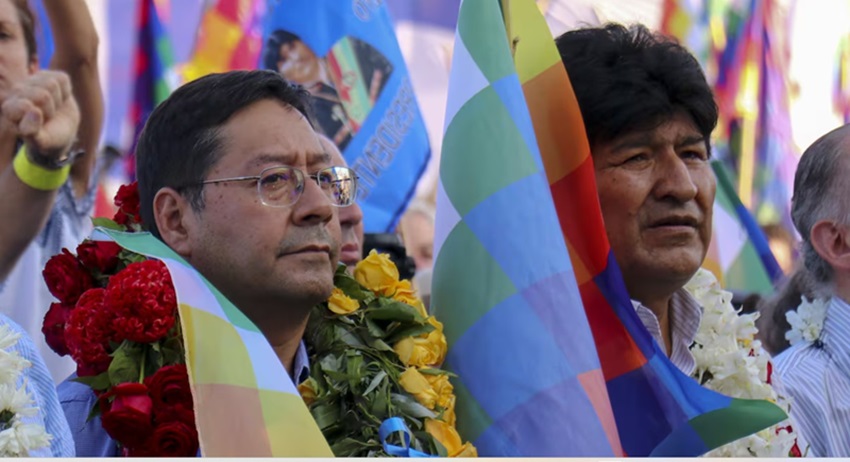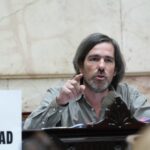
Finding himself without political or social support, the former commander-in-chief of the army, Juan José Zúñiga, had to accept his replacement and the appointment of a new General Staff while the troops in Plaza Murillo were demobilized. Almost immediately after the arrest of Zúñiga and nearly twenty soldiers involved in the uprising, voices gained strength interpreting the recent events as an attempted self-coup and even a “circus set-up” promoted by President Luis Arce “to regain popularity.” This interpretation is supported by Zúñiga’s statements that he had been betrayed by President Arce, the absence of deaths and/or strong confrontations, and the supposed calm with which government officials went through the crisis.
However, the most striking thing about this dispute over the nature of the events of June 26 is that former President Evo Morales joined in, who on his X account apologized to the international community for the government’s shameless use of an alleged coup d’état to cover up the staging of a circus show.
Evo Morales and his alignment with the national and continental right
According to Evo Morales, “patriotic soldiers” had informed him that what happened on June 26 was actually a self-coup to arrest him and prevent his eventual candidacy for the 2025 elections, as Zúñiga had stated on June 24 during a television interview.
In his morning program on Radio Kausachun Coca (RKC) Evo Morales declared:
“Before his arrest (Zúñiga) he informed his comrades and family that Lucho betrayed him, he has just confirmed it. In the cells of the Felcc, General Zúñiga said ‘Lucho has betrayed me’, he repeated that. These new elements make me believe that it is a self-coup, or finally that Lucho has planned well to use the Army, to do so much damage to the Army, (then) make himself a victim with crocodile tears with such a lie. I want to take this opportunity to tell the whole world, to apologize. Unfortunately Lucho lied, he deceived the Bolivian people and the whole world with this coup or self-coup.”
At the end of his program and accompanied by Congressman Héctor Arce, who showed documents of alleged “million-dollar businesses” of the president’s relatives, Morales said that “a family mafia governs Bolivia.”
Far from the presence of tanks in Plaza Murillo having allowed the “unity” of the MAS as some thought, it seems that the division between two of the strongest factions of the MAS, “arcistas” and “evistas”, would be irreversible. Evo Morales’ statements were taken up by none other than Javier Milei, president of Argentina, who refused to repudiate the coup attempt and, like Morales, fired his darts at Luis Arce. This objective alignment of Evo Morales with the national and regional right is carried out without fear of dusting off the most rancid arguments that the right-wing opposition used at the time to deny the coup and the massacres of November 2019.
Morales, realizing that his statements were being exploited by the entire right-wing spectrum, had to publish another message denouncing Milei for interference, but without backing down on his accusations against the Arce government.
These statements by Evo, after June 26, motivated the Minister of the Presidency, Marianela Prada, to dedicate herself to “dismantling” Evo’s arguments one by one on the state channel, stating that “he suffers from ideological emptiness.”
The “patriotic military” of the process of change, an illusion shared by Evistas and renovators
According to Evo Morales, the sources of information that support his statements denying the coup attempt were provided by a group of “patriotic soldiers” who had alerted the former president’s supporters to take cover since Arce had planned to arrest him after a military junta took over the palace. However, this whole story clashes with the events that took place that day and with the way in which the coup attempt was resolved.
The fact that Morales appeals again to these supposedly patriotic military personnel reveals that far from having learned anything during the 2019 coup, he maintains the same strategy of placing trust and beautifying the Armed Forces in the same way that Luis Arce and the reformist wing do with other fractions of the army. On this point, they have no differences with the right-wing opposition that carried out a successful coup d’état in 2019 with the help of the armed institutions.
Let us remember that Evo Morales was sent out of the palace and the country because Kaliman, commander general at the time and close friend of Morales, asked him to resign on November 10, 2019. In the same way, Senator Rolando Cuéllar, close to Arce, a day before Zúñiga’s coup attempt, was promoting in the Chamber of Deputies a decoration for this military man that should take place this week, while declaring that unlike Evo Morales and Kaliman, Arce’s relationship with Zúñiga was based on loyalty and there was no risk of a coup d’état. As we see, these confident statements by Cuellar today or before Morales with Kaliman, are illusions that far from being errors as some describe, are the expression and result of a political strategy.
The so-called “process of change,” as the MAS coined it at the beginning of its first government in 2006, had as its ultimate goal a supposed democratic and cultural revolution, which never sought to overcome the limits of capitalist society but rather to aim for its democratization. As part of these objectives, various legislative reforms were promoted that penalized racism and discrimination, expanded the state structure through indigenous and/or departmental autonomies, encouraged legal pluralism and various provisions that, according to the MAS ideologues, would lead to a radical democratization of Bolivian society. However, these state reforms always stopped at the threshold of the Armed Forces, with the government of Evo Morales even going so far as to repress and persecute the lower ranks of the army who in 2015 demanded “decolonizing the Armed Forces.” Morales tried to compensate for the ideological and doctrinal training of the Armed Forces, whose members largely attended the School of the Americas, by promoting an “Anti-Imperialist School of the Armed Forces” that was revealed to be a mere farce in 2019.
The objectives of the MAS in its various wings never sought to overcome the limits of capitalist society and its institutions, which led to the Armed Forces maintaining their classist and racist structure and nature, consistent with the classist structure of the State, which, although with the new adjective of plurinational, continued to be the State that guarantees the reproduction of capitalist social relations.
The loyalty of the army and the armed forces was guaranteed by various perks and privileges, such as the fact that the government invests 2.6 times more to provide 100% retirement benefits to the military than to the rest of the population; participation in the administration of some state-owned companies; imperialist missions such as in Haiti; and others. Far from bringing the armed institutions closer to the people as promised by the MAS, in reality it brought these institutions closer to the circles of economic and political power, while they were gaining greater political prominence.
The increasingly authoritarian features of the last years of Morales’ government pushed him to increasingly rely on the power of all the punitive apparatuses of the State, such as the police and the Armed Forces, reaching the point of being absolutely dependent on the decisions of these forces in 2019, which hours before the coup were described as “anti-imperialist” and even revolutionary. Currently, during the government of Luis Arce, his profound weakness after the break with the evismo, also leads him, like Evo Morales, to rely more and more on the armed institutions, causing this growing military prominence in national political life.
The dangerous and reactionary calls of the Evo movement for the intervention of the Armed Forces
The flirtation of the Evo movement with the positions of the continental right, however, is even more dangerous than it seems, since Evo deputies are beginning to issue statements that border on a call for the Armed Forces to intervene. The statements of the Evo deputy, Freddy López, leave no room for equivocation regarding this dangerous coup tendency. López, when interviewed by Radio Kausachum Coca (RKC), not only demanded an investigation of what he called a self-coup, but also questioned the Minister of Government, Eduardo Del Castillo, for the arrests of military personnel that followed the failed coup attempt. In his words:
“(…) Because it is not possible that they continue to undermine the dignity of the military, just for the benefit of the Executive, of General Zúñiga and of the president himself. (…) I am very sorry that the Ministry of Government is presenting the Army as criminals and thugs. (…) The Minister of Government is “crossing the line” by acting in this way, presenting these people who have studied for 5 years and were serving the country. What is happening now is inexplicable.”
When asked by the journalist what the Armed Forces should do, López concluded: “I think that the military authorities must speak out and it cannot be left like this. Because these events must not be left like this, that is why the soldiers who are involved are closely watching all these events (…) I have been a soldier and we know how to work and how to respect the military forces. The commanders must speak out against this manipulation and express their annoyances against these witch hunts to the military.”
With these statements, it seems that López is calling on the Armed Forces to act and settle the enormous dispute that the Arcistas and Evistas are having, and where it seems that both factions of the MAS are betting that it will be the courts or the Armed Forces who will end up resolving whether Evo Morales or Luis Arce will be the next head of the MAS. In this framework, the social movements, which were supposed to be the subjects of the “process of change” end up being stone guests in this equation.
What was once intended to be the Political Instrument of Social Movements ended up moving away from the needs of those below and repeating the “trajectory” of the MNR in the 1960s.
The situation of deep political crisis that threatens to worsen the delicate economic situation requires an assessment of the governments of the MAS with Evo and with Arce because although they do not tire of distilling mutual accusations of betrayal and right-wing drift, the truth is that the current situation is an expression of a continuity in their policy of conscious adaptation in favor of the interests of businessmen and agro-industrialists that ends up opening the way to the right.
Faced with this open scenario, it is time for the working people of the countryside and the city, the working youth, the women’s movement and the movement of sexual and gender diversity and dissidence, the popular sectors, the indigenous and peasant movement to begin to prepare and advance in our democratic self-organization and mobilization independent of the State and of all the parties that defend capitalist society.
Source: www.laizquierdadiario.com

